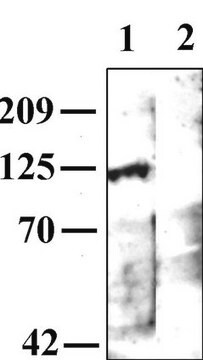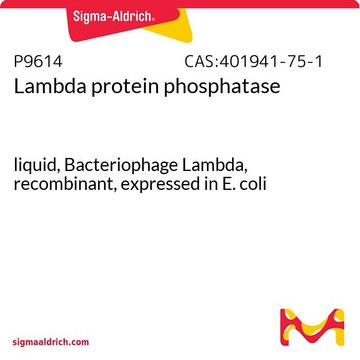MAB1576
Anti-Muscarinic Acetylcholine Receptor m4 Antibody, clone 17F10.2
purified antibody, clone 17F10.2, Chemicon®
About This Item
Prodotti consigliati
Origine biologica
mouse
Livello qualitativo
Forma dell’anticorpo
purified antibody
Tipo di anticorpo
primary antibodies
Clone
17F10.2, monoclonal
Reattività contro le specie
mouse, monkey, rat
Produttore/marchio commerciale
Chemicon®
tecniche
immunocytochemistry: suitable
immunoprecipitation (IP): suitable
western blot: suitable
Isotipo
IgG1
N° accesso NCBI
N° accesso UniProt
Condizioni di spedizione
wet ice
modifica post-traduzionali bersaglio
unmodified
Informazioni sul gene
mouse ... Chrm4(12672)
rat ... Chrm4(25111)
rhesus monkey ... Chrm4(574195)
Specificità
Immunogeno
Applicazioni
Western blot (rat, mouse, human): ECL 4-10 μg/mL
Immunoprecipitation (rat)
Optimal working dilutions must be determined by the end user.
Neuroscience
Neurotransmitters & Receptors
Stato fisico
Stoccaggio e stabilità
Altre note
Note legali
Esclusione di responsabilità
Non trovi il prodotto giusto?
Prova il nostro Motore di ricerca dei prodotti.
Codice della classe di stoccaggio
10 - Combustible liquids
Classe di pericolosità dell'acqua (WGK)
WGK 2
Punto d’infiammabilità (°F)
Not applicable
Punto d’infiammabilità (°C)
Not applicable
Certificati d'analisi (COA)
Cerca il Certificati d'analisi (COA) digitando il numero di lotto/batch corrispondente. I numeri di lotto o di batch sono stampati sull'etichetta dei prodotti dopo la parola ‘Lotto’ o ‘Batch’.
Possiedi già questo prodotto?
I documenti relativi ai prodotti acquistati recentemente sono disponibili nell’Archivio dei documenti.
Il team dei nostri ricercatori vanta grande esperienza in tutte le aree della ricerca quali Life Science, scienza dei materiali, sintesi chimica, cromatografia, discipline analitiche, ecc..
Contatta l'Assistenza Tecnica.






